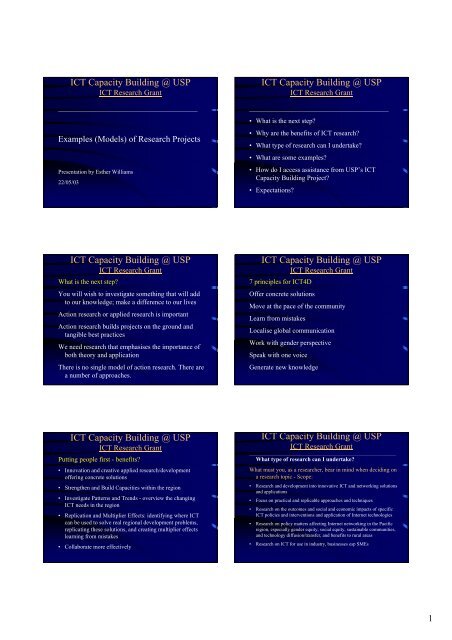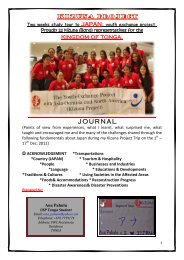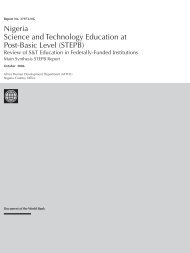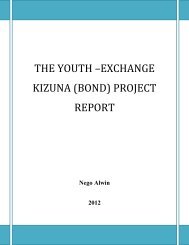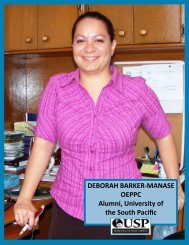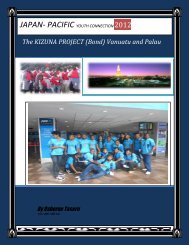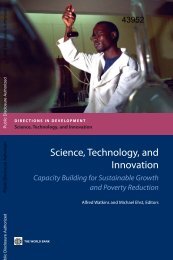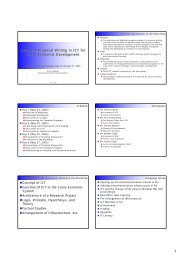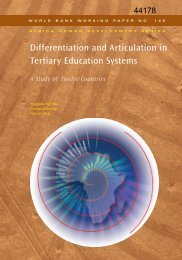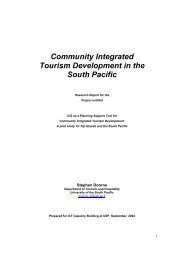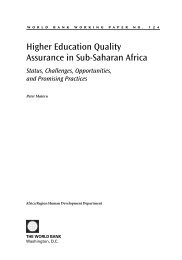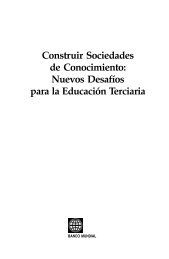ICT Capacity Building @ USP ICT Capacity Building @ USP ICT ...
ICT Capacity Building @ USP ICT Capacity Building @ USP ICT ...
ICT Capacity Building @ USP ICT Capacity Building @ USP ICT ...
Create successful ePaper yourself
Turn your PDF publications into a flip-book with our unique Google optimized e-Paper software.
<strong>ICT</strong> <strong>Capacity</strong> <strong>Building</strong> @ <strong>USP</strong><br />
<strong>ICT</strong> Research Grant<br />
________________________________________________<br />
Examples (Models) of Research Projects<br />
Presentation by Esther Williams<br />
22/05/03<br />
<strong>ICT</strong> <strong>Capacity</strong> <strong>Building</strong> @ <strong>USP</strong><br />
<strong>ICT</strong> Research Grant<br />
________________________________________________<br />
• What is the next step<br />
• Why are the benefits of <strong>ICT</strong> research<br />
• What type of research can I undertake<br />
• What are some examples<br />
• How do I access assistance from <strong>USP</strong>’s <strong>ICT</strong><br />
<strong>Capacity</strong> <strong>Building</strong> Project<br />
• Expectations<br />
<strong>ICT</strong> <strong>Capacity</strong> <strong>Building</strong> @ <strong>USP</strong><br />
<strong>ICT</strong> Research Grant<br />
What is the next step<br />
You will wish to investigate something that will add<br />
to our knowledge; make a difference to our lives<br />
Action research or applied research is important<br />
Action research builds projects on the ground and<br />
tangible best practices<br />
We need research that emphasises the importance of<br />
both theory and application<br />
There is no single model of action research. There are<br />
a number of approaches.<br />
<strong>ICT</strong> <strong>Capacity</strong> <strong>Building</strong> @ <strong>USP</strong><br />
<strong>ICT</strong> Research Grant<br />
7 principles for <strong>ICT</strong>4D<br />
Offer concrete solutions<br />
Move at the pace of the community<br />
Learn from mistakes<br />
Localise global communication<br />
Work with gender perspective<br />
Speak with one voice<br />
Generate new knowledge<br />
<strong>ICT</strong> <strong>Capacity</strong> <strong>Building</strong> @ <strong>USP</strong><br />
<strong>ICT</strong> Research Grant<br />
Putting people first - benefits<br />
• Innovation and creative applied research/development<br />
offering concrete solutions<br />
• Strengthen and Build Capacities within the region<br />
• Investigate Patterns and Trends - overview the changing<br />
<strong>ICT</strong> needs in the region<br />
• Replication and Multiplier Effects: identifying where <strong>ICT</strong><br />
can be used to solve real regional development problems,<br />
replicating these solutions, and creating multiplier effects<br />
learning from mistakes<br />
• Collaborate more effectively<br />
<strong>ICT</strong> <strong>Capacity</strong> <strong>Building</strong> @ <strong>USP</strong><br />
<strong>ICT</strong> Research Grant<br />
_____________________________________________________________________________________________________<br />
What type of research can I undertake<br />
What must you, as a researcher, bear in mind when deciding on<br />
a research topic - Scope:<br />
• Research and development into innovative <strong>ICT</strong> and networking solutions<br />
and applications<br />
• Focus on practical and replicable approaches and techniques<br />
• Research on the outcomes and social and economic impacts of specific<br />
<strong>ICT</strong> policies and interventions and application of Internet technologies<br />
• Research on policy matters affecting Internet networking in the Pacific<br />
region, especially gender equity, social equity, sustainable communities,<br />
and technology diffusion/transfer, and benefits to rural areas<br />
• Research on <strong>ICT</strong> for use in industry, businesses esp SMEs<br />
1
<strong>ICT</strong> <strong>Capacity</strong> <strong>Building</strong> @ <strong>USP</strong><br />
<strong>ICT</strong> Research Grant<br />
_____________________________________________________________________________________________________<br />
Before you start, You need a vision, for instance:<br />
Providing accelerated access to <strong>ICT</strong> for all Pacific<br />
Islanders<br />
Create <strong>ICT</strong>-enabled environments<br />
Create e-opportunities that will improve the lives of<br />
the rural and urban poor<br />
Ultimately, <strong>ICT</strong>s permeates all levels of society<br />
<strong>ICT</strong> <strong>Capacity</strong> <strong>Building</strong> @ <strong>USP</strong><br />
<strong>ICT</strong> Research Grant<br />
_____________________________________________________________________________________________________<br />
Some Project Areas which you could consider<br />
Bridging the digital divide and providing equitable access -<br />
focus on rural poor,rural access,overcoming gender divide,<br />
connectivity, socio-economic cultural issues<br />
Developing capacity to deploy <strong>ICT</strong>s - DE, SMEs, e-business, e-<br />
government<br />
Engaging regional technical engineers - leapfrogging technical<br />
adoptions<br />
Networking innovations - opportunities for south-south <strong>ICT</strong>4D<br />
exchanges<br />
<strong>ICT</strong> policy and development<br />
<strong>ICT</strong> <strong>Capacity</strong> <strong>Building</strong> @ <strong>USP</strong><br />
<strong>ICT</strong> Research Grant<br />
_____________________________________________________________________________________________________<br />
Some of our research themes<br />
• poverty reduction and <strong>ICT</strong> (including the MDG)<br />
• education technologies and DE<br />
• rural connectivity and telecommunication community<br />
centres<br />
• <strong>ICT</strong>s and gender issues<br />
• networking<br />
• e-government<br />
• e-commerce<br />
• <strong>ICT</strong> and SMEs<br />
<strong>ICT</strong> <strong>Capacity</strong> <strong>Building</strong> @ <strong>USP</strong><br />
<strong>ICT</strong> Research Grant<br />
_____________________________________________________________________________________________________<br />
• WSIS Theme for 2003 (World Summit for the Information Society)<br />
• Access to <strong>ICT</strong>s for All<br />
– "ensure that the benefits of new technologies, especially<br />
information and communication technologies ... are available to<br />
all".<br />
• <strong>ICT</strong>s as a Tool for Economic and Social Development – Meeting the<br />
Millennium Development Goals<br />
– "the urgent need to harness the potential of knowledge and<br />
technology for promoting the goals of<br />
the United Nations (UN) Millennium Declaration and to find<br />
effective and innovative ways to put this potential<br />
at the service of development for all".<br />
<strong>ICT</strong> <strong>Capacity</strong> <strong>Building</strong> @ <strong>USP</strong><br />
<strong>ICT</strong> Research Grant<br />
What are some examples<br />
I would like to share with you some information on examples as member of<br />
the IDRC R&D Grants Committee for Asia and the Pacific.<br />
• Present Grants programme built on IDRC’s Pan Asia Networking (PAN)<br />
Programme Initiative in October 1997 – The PanAsia RnD Grants<br />
Programme (1997-2001)<br />
– A total of 26 grants were awarded during this period<br />
– www.panasia.org.sg/grants/awards/<br />
• The new IDRC/APDIP/APNIC/AMIC partnership - 2002 - 2003<br />
– IDRC, APDIP, APNIC are the principle contributors<br />
– AMIC manages and administers the Programme<br />
This Committee commits funds ranging from US5,000.00 for small projects<br />
to US30,000.00 for large ones<br />
<strong>ICT</strong> <strong>Capacity</strong> <strong>Building</strong> @ <strong>USP</strong><br />
<strong>ICT</strong> Research Grant<br />
• 1 st Competition Round (January 2002)<br />
– 97 proposals received from 26 countries<br />
• 2 nd Competition Round (September 2002)<br />
– 103 proposals received from 17 countries<br />
• Thirteen (13) Grants were awarded for 2002<br />
• 3 rd Competition Round (February 15, 2003)<br />
– 49 proposals received from 20 countries<br />
• Six (6) Grants were awarded in March 2003<br />
2
<strong>ICT</strong> <strong>Capacity</strong> <strong>Building</strong> @ <strong>USP</strong><br />
<strong>ICT</strong> Research Grant<br />
Examples<br />
• Development of <strong>ICT</strong> Based Telemedicine System for Primary<br />
Community Healthcare in Indonesia Biomedical Engineering Laboratory,<br />
Institute Tekologi Bandung, Indonesia<br />
• Information & Communication Technologies (<strong>ICT</strong>s) Assisted Learning<br />
Tool for the Deaf in Pakistan, Sustainable Development Networking<br />
Programme<br />
• Wireless Internet Post Office, IBM India Research<br />
• Jhai Remote IT Village, Jhai Foundation, Lao PDR<br />
• Nepal Internet Exchange, Computer Association of Nepal<br />
• <strong>ICT</strong> Serving for Agriculture and Rural Development in a Prototype<br />
County, China Agriculture University<br />
Jhai Remote IT Village, Jhai Foundation, Lao<br />
PDR<br />
Pedal Power – where there is no electricity<br />
-Lao Language system<br />
-Access through Open Source and Wireless Technologies<br />
-Innovative, Affordable, and Replicable<br />
<strong>ICT</strong> <strong>Capacity</strong> <strong>Building</strong> @ <strong>USP</strong><br />
<strong>ICT</strong> Research Grant<br />
Other Examples<br />
• Distance Learning Application of the Solomon Islands People First<br />
Network (PFnet), Rural Development Volunteers Association (RDVA),<br />
Solomon Islands<br />
• Evaluating the Impact of Universal Access Models, Strategies and<br />
Policies in <strong>ICT</strong>s on Poor Communities in the Philippines, National<br />
College of Public Administration and Governance (NCPAG), Quezon<br />
City, Philippines<br />
• Diffusion of Information and Communication Technologies in India:<br />
Labour Market Implications for Developing Countries, Indian Institute of<br />
Information Technology, Bangalore, India<br />
• Leveraging Information Communication Technologies (<strong>ICT</strong>) Through<br />
Weekly Market Centres for Tribal (indigenous) Communities, Satpura<br />
Integrated Rural Development Institution (SIRDI), Maharashtra, India<br />
<strong>ICT</strong> <strong>Capacity</strong> <strong>Building</strong> @ <strong>USP</strong><br />
<strong>ICT</strong> Research Grant<br />
<strong>USP</strong>: 1st round of competition 2003 the University received<br />
9 applications. Of these:<br />
One has been undertaken and completed:<br />
Evaluation of Computer Studies Curriculum in Fiji Schools by<br />
Esther Williams, Maki Kato and Natasha Khan<br />
Two others being considerd:<br />
-E-Commerce in the tourism sector in Fiji by Biman Prasad,<br />
Shiu Raj, Paresh Narayan<br />
-Maximising the benefits of <strong>ICT</strong>Multimedia in the South<br />
Pacific: Cultural Pedagogy and Usability Factors by<br />
Christopher Robbins, Maraia Lesuma<br />
<strong>ICT</strong> <strong>Capacity</strong> <strong>Building</strong> @ <strong>USP</strong><br />
<strong>ICT</strong> Research Grant<br />
Evaluation of Computer Studies Curriculum in Fiji Schools by<br />
Esther Williams, Maki Kato and Natasha Khan<br />
Develop recommendations for a model CS/IT Curriculum for<br />
Fiji<br />
Methodology:<br />
• Literature search for possible benchmarking<br />
• Questionnaires<br />
• Surveys<br />
• Face to face interviews<br />
• Focus groups interviews<br />
• Meetings with the Ministry of Education staff<br />
<strong>ICT</strong> <strong>Capacity</strong> <strong>Building</strong> @ <strong>USP</strong><br />
<strong>ICT</strong> Research Grant<br />
Evaluation of Computer Studies Curriculum in Fiji Schools by<br />
Esther Williams, Maki Kato and Natasha Khan<br />
Scope<br />
• 80 schools of the 84 offering CS/IT courses were visited and<br />
interviews conducted.<br />
• Three questionnaires were prepared: for students, teachers<br />
and stakeholders. Schools were asked to complete the<br />
questionnaires as well<br />
• 52% of teachers questionnaires were returned; 72% students<br />
and 68% stakeholders<br />
Outputs<br />
• Clear recommendations to the Ministry of Education, Fiji for a way<br />
forward for developing a model curriculum for CS/IT<br />
• Establish a network, a webpage, for teachers<br />
• Produce a final Report that will be shared and available<br />
3
<strong>ICT</strong> <strong>Capacity</strong> <strong>Building</strong> @ <strong>USP</strong><br />
<strong>ICT</strong> Research Grant<br />
E-Commerce in the tourism sector in Fiji by Biman Prasad,<br />
Shiu Raj, Paresh Narayan<br />
- Collaborative research<br />
- Investigate the expanded use of <strong>ICT</strong> in and impact on Fiji’s<br />
tourism industry<br />
- Methodology will include structured questionnaire interviews,<br />
data collection.<br />
<strong>ICT</strong> <strong>Capacity</strong> <strong>Building</strong> @ <strong>USP</strong><br />
<strong>ICT</strong> Research Grant<br />
Maximising the benefits of <strong>ICT</strong>Multimedia in the South<br />
Pacific: Cultural Pedagogy and Usability Factors by<br />
Christopher Robbins, Maraia Lesuma<br />
Attempts to determine how educational <strong>ICT</strong>/Multimedia can be<br />
developed so as to be responsive to the particular needs of<br />
the region, and to apply these findings to the production of a<br />
model educational multimedia project such an interactive<br />
CD-ROM and website.<br />
<strong>ICT</strong> <strong>Capacity</strong> <strong>Building</strong> @ <strong>USP</strong><br />
<strong>ICT</strong> Research Grant<br />
There is another that is being developed :<br />
Promoting Open Telecommunication Legislation and<br />
Non-Regulatory Environment in Fiji for Improved<br />
Economic Growth and Social Development<br />
-comprehensive study and indepth analysis showing that<br />
regulation, monopolistic situation in the industry and<br />
associated limited bandwith, expensive and restricted access,<br />
unused capacity in the Southern Cross Cable constitute an<br />
unacceptable drag on the Fiji economy<br />
What is the impact of telecommunication policies on economic<br />
and social development Will compare Fiji to Tonga and<br />
Samoa<br />
<strong>ICT</strong> <strong>Capacity</strong> <strong>Building</strong> @ <strong>USP</strong><br />
<strong>ICT</strong> Research Grant<br />
_____________________________________________________________________________________________________<br />
How do I access assistance from <strong>USP</strong>’s <strong>ICT</strong> <strong>Capacity</strong><br />
<strong>Building</strong> Project<br />
The <strong>ICT</strong> R&D Grant is for research project funding only, and<br />
may not be accessed to cover core or recurrent funding needs<br />
such as staff. Grants can be applied for, as follows:<br />
– Grants, up to a maximum budget of FJD$40,000.00<br />
available over a term not exceeding 12 months.<br />
The second round of applications closes 2nd June 2003<br />
The form is on the website. You must complete the proposal as<br />
per the form<br />
If you need further information, contact Kato_m@usp.ac.fj<br />
<strong>ICT</strong> <strong>Capacity</strong> <strong>Building</strong> @ <strong>USP</strong><br />
<strong>ICT</strong> Research Grant<br />
_____________________________________________________________________________________________________<br />
Expectations<br />
Your Questions<br />
4


